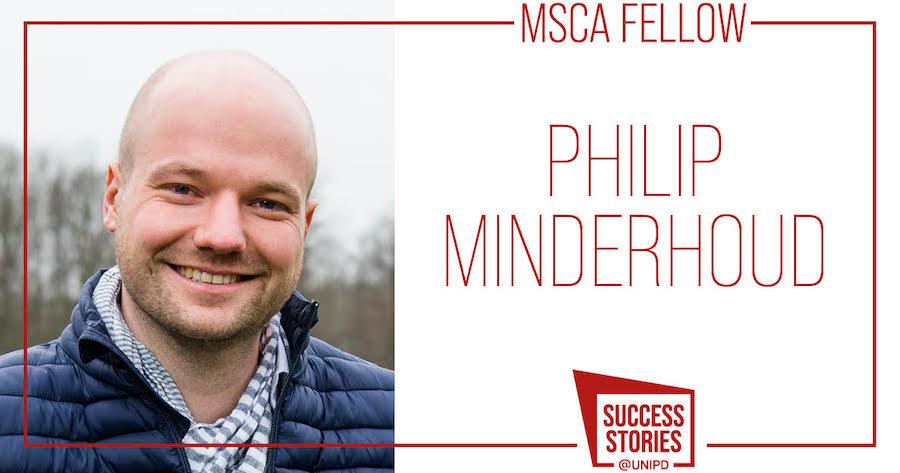
MSCA Fellow: Philip Minderhoud
Science doesn’t stop when it is published in a scientific journal, it is an ongoing process in which science and society together thrive towards a better future!

Philip Minderhoud is a MSCA Fellow at the Department of Civil, Environmental and Architectural Engineering. He comes from the Netherlands, where he studied and worked as earth scientist in academia.
We all see that sea level is rising and we blame climate change for that. Philip tells us that the phenomenon may also be caused by sinking of river deltas and coastal areas instead. Philip makes us aware of what is happening to our Veneto region, as he studies the river Po delta and the Venice lagoon. Let’s read his interview and watch his videos in the field!
Can you explain us what your research work is about?
In my research, I study the sinking of river deltas and coastal areas, like for example the Po delta and the lagoon of Venice. Climate change is causing the sea level to raise, but in many places the land itself is sinking as well. We call this process land subsidence. When a coastal area sinks, this results in a local increase of relative sea-level rise. For example, if you sink, the sea level seems to rise faster. It is very important to study this phenomenon, as at moment people worldwide living along the coast are actually experiencing more relative sea-level rise due to delta subsidence rather than due to global warming.
What impact do you expect your research project will have? Who will benefit from your research?
I am developing a new computer model together with my colleagues at the Department of Civil, Environmental and Architectural Engineering (DICEA) and an approach to be able to simulate the processes of land subsidence in deltas. We do this so we can create better predictions of future subsidence. This will help policymakers and delta managers to make future management plans that include not just sea level rise but also subsidence.
You obtained your PhD in Utrecht – NL and you continued working there as a postdoc; why did you decide to come to Padua?
Padua is the university where the first 3D model of land subsidence for the iconic city of Venice was built, already in 1973 by Prof. Gambolati. This shows the long tradition in this field of research and the unique knowledge that has been gathered here since then. The research group I work with at Padua is under the supervision of Professor Pietro Teatini, who is world famous in the field of land subsidence. Together with, for example, Claudia Zoccarato (Ph.D.), Professor Massimiliano Ferronato, Andrea Franceschini (Ph.D.) and others, I am able to learn a lot of new skills and knowledge on how to make land subsidence models for deltas. Besides these reasons, Padua is also a very nice city to live in and, at its ancient university, you breathe an inspiring academic atmosphere.
You have been active in outreach activities for the general public for many years: why is it important for you to communicate science?
One great driver for me to do my scientific research is the possibility of addressing an important societal issue, in my case the sinking of deltas. I believe that, through science, we can learn a lot about how natural deltas and landscapes function. This will help humans to live in better sync with natural processes, rather than having to fight them, and in a sustainable way.
Through my research, I did several societal relevant discoveries and I feel that, as scientists, we have a duty to society to share such new insights and engage in dialogues and cooperations to translate science-to-policy and science-to-society. For me, science doesn’t stop when it is published in a scientific journal, it is an ongoing process in which science and society thrive in one another, towards a better future.
On one hand, I try to communicate my science to a broader public to raise general awareness and, on the other hand, I also work a lot together with policymakers, NGOs and government institutes that aim at solving the problem of sinking deltas.
What are your plans for the future, after you complete your MSCA-IF fellowship?
While finishing my MSCA-IF project as a part-time fellow, I am also taking up an Assistant Professorship position at the University of Wageningen, in the Netherlands. I have always enjoyed working at different institutes and establishing connections, and I am glad I am able to both continue and complete my MSCA research and to work on the next step of my scientific career. It will also strengthen the connection between UNIPD and Wageningen University.
I believe my MSCA-IF definitely helped me in being appointed for this position. One of the main goals of the MSCA-IF is to support an early career researcher to secure a position in science and, in this regard, my fellowship has already been a success.
What would you suggest to a researcher that is thinking about applying for a MSCA-IF?
Without trying to sound cliché, my MSCA-IF so far has been an amazing journey. It really pushed me to take a step up in my academic development. Working in a different country, with a different research culture and in a different scientific field has been an experience that exceeded my expectations. If you are considering an MSCA-IF, don’t be turned down by the odds and just go for it. It may change your life for the better, which definitely did in my case.
As a concrete suggestion when you plan to apply, try to imagine where and who you want to be in ten years from now and see how the MSCA-IF can help you achieve that future. Good luck and may the odds be in your favour!
Do you wish to learn more about Philip’s work? Click on the following links and enjoy!
https://www.youtube.com/watch?v=fHwY6miQ2Zs
International Research Office
via Martiri della libertà 8, 35137 Padova, Italy
tel. +39 049.827 1947 / 1948 / 1945
fax +39 049.827 1911
international.research@unipd.it


